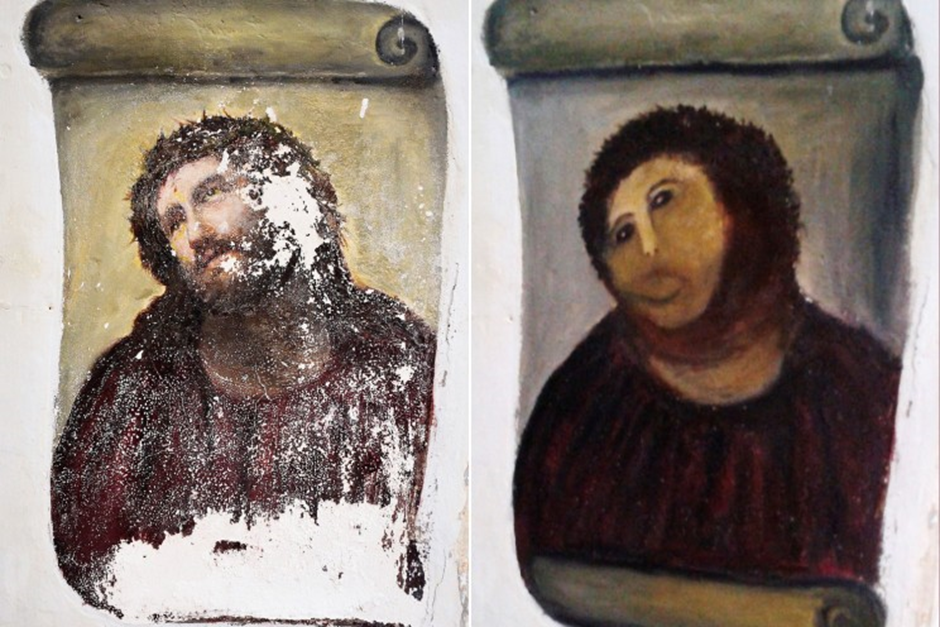There are many inspirational stories of women in real life who save the day. Women whose superpowers lie not in their physical strength but on their charm, emotional intelligence and wit.
Sometimes strange circumstances give rise to unlikely heroes.
In 1930, Elias Garcia Martinez produced a fresco—a painting on fresh plaster— on the wall of a church in Spain. He named it Ecce Homo or “Behold the Man”.
Time had not been kind to the fresco, so in 2012, Cecilia Giménez, an amateur painter, flexed her artistic muscles to restore “Behold the Man”.
The beautiful and tender original of Christ crowned with thorns was dramatically altered by her restoration and later met with derision and ridicule.
The internet blew up with memes and parodies, some comparing the restored version of Jesus to a monkey, or worse—a blurry potato.
From Mockery to Monetary gain
Droves of tourists wanting to see the terrible work of art with their own eyes inundated the sleepy town of Borja. The impact of Ecce Homo generated thousands of Euros for the local economy.
Local and neighbouring museums, restaurants, shop owners, traders selling Ecce Homo souvenirs, and nearby vineyards all profited from the boost in tourism.
Opera to Movies
The ugly fresco also inspired a comic opera. Andrew Flack and Paul Fowler created the opera that debuted in Borja, 2016. Flack said the painting had “all the operatic qualities: faith, redemption and revenge.”
The fresco also appeared in a Spanish movie in which thieves attempt to steal the “work of art”.
Cecilia Giménez inadvertently rescued her town through her mediocre paint brushing skills. Some might even call it a miracle.

Wonder Woman
Another Wonder Woman shines in 2 Samuel 20. The three key players in the passage are Joab, Sheba and the wise woman.
Sheba
Sheba is a Benjamite, and an opportunist. He carefully considers the conflict between the ten tribes of Israel in the North and Judah in the South. Acting to his own advantage and desirous of support from Saul’s allies, he leads a rebellion against King David.
And he blew a trumpet, and said, We have no part in David, neither have we inheritance in the son of Jesse; every man to his tents, O Israel. 2 Samuel 20:1b
Now, Sheba the rebel rouser is on the run from Joab.
Joab
Joab was King David’s military commander. In 2 Samuel 10, we find Joab demoted for killing the king’s rebel son, Prince Absalom, who had led a revolt against his own father.
Joab asks to speak privately with the new military chief, Amasa, who is also Joab’s cousin. The ex-military chief takes a calculated risk. In the middle of greeting his near relative with the kiss of peace, Joab fatally stabs the unsuspecting Amasa in the stomach.
After treacherously dispatching his own cousin, Joab rallies the soldiers to continue the mission that King David had originally set for Amasa—to capture Sheba.
Joab and the wise woman at the city of Abel of Bethmaachah
Please read 2 Samuel 20:15-22
First, came the cries of war. Then came the deafening boom of a battering ram. The city’s stonewalls appeared to shiver with every blow. Underfoot, the ground seemed to come alive. It trembled as the vibrations rippled up through the earth.
The city of Abel was under attack!
Weaving through a gawking cluster of townsfolk, one brave woman pushes her way to face off with the man who ordered the siege.
She is not given a name in the biblical narrative. She is simply referred to as a wise woman.
Some scholars believe that the title, ‘Wise Woman’ represented a leadership role with political power, like the well-respected female Judge, Deborah.
A wise woman possessed the ability to reason and give wise counsel. She was a tough negotiator with a silver tongue to her avail.
This particular wise woman was not one to shy away from a confrontation. Her moxie gains Joab’s full attention and he must stop what he is doing mid-siege.
She calls to him for negotiations.
Then cried a wise woman out of the city, Hear, hear; say, I pray you, unto Joab, Come near hither, that I may speak with thee. 2 Sam 20:16
In her negotiations, she asks Joab why he is attacking a city known as a mother in Israel. Using the metaphor of ‘mother’ signified that the city was very important and influential among the group of towns surrounding it.
To add further weight, she describes how the city is famous for its wisdom and the wise and peace loving people living within its walls. She pricks at his conscience by asking why he would ‘swallow up the inheritance of the Lord’.
I am one of them that are peaceable and faithful in Israel: thou sleekest to destroy a city and a mother in Israel: why wilt thou swallow up the inheritance of the Lord? 2 Samuel 20:19
This wise woman knows God’s word. She further persuades Joab to reconsider his actions.
She reasons with Joab and challenges his thinking, reminding him of the rules of war set out in scripture.
When thou comest nigh unto a city to fight against it, then proclaim peace unto it. Deut 20:10

In other words, Joab was to offer peace before he made an attack on the city according to the known law of war. If a deal was made with the citizens of Abel, Joab was required to abide by that agreement.
At the forefront, Joab was to seek peace before war. This is implied, but not directly stated in 2 Samuel 20:18.
Then she spake, saying, they were wont to speak in old time, saying, They shall surely ask counsel at Abel: and so ended the matter.
According to Matthew Henry, the margin reads
They plainly spoke in the beginning (of the siege), saying, Surely they will ask of Abel, that is, “The besiegers will demand the traitor, and will ask us to surrender him; and if they do, we will soon come to an agreement, and so end the matter.”
In a speedy resolution, the wise woman and Joab agree that only one person would lose his life that day. It would be the traitor Sheba hiding amongst the citizens of Abel.
She addresses her people and convinces them all to capture and slay Sheba to save their city.
Then the woman went unto all the people in her wisdom. And they cut off the head of Sheba the son of Bichri, and cast it out to Joab.
And he blew a trumpet, and they retired from the city, every man to his tent. And Joab returned to Jerusalem unto the king. 2 Sam 20:22
Through her wisdom, persuasiveness and initiative she saved the lives of her town and its citizens. For it was better for one person to die in order to preserve the rest, with the head of Sheba as the ransom price.
It reminds me of another story of redemption, a ransom paid with blood, where one man offered his life to save the world.
Bibliography
Author unspecified. 2010, ‘Joab: The Power Behind the Throne’, Spectrum magazine.org. Retrieved 12 November 2021 from
https://spectrummagazine.org/article/sabbath-school/2010/11/14/joab-power-behind-throne
Author unspecified, 2018, ‘Sheba’s Rebellion – 2 Samuel 20’, Redeemed mind.com. Retrieved 12 November from 2021 from
https://redeemedmind.com/2018/12/28/shebas-rebellion-2-samuel-20/
Camp, C. 1999, ‘Wise Woman of Abel Beth-Maacah: Bible.” The Shalvi/Hyman Encyclopedia of Jewish Women, Jewish Women’s Archive. Retrieved 12 October 2021 from
https://jwa.org/encyclopedia/article/wise-woman-of-abel-beth-maacah-bible
Chu, C. 2014, ‘Botched Restoration of Jesus Fresco Miraculously Saves Spanish Town’, Artnet News. Retrieved 10 October 2021 from
Kussin, A. 2016, ‘Infamous botched Jesus painting now a major tourist attraction’, The New York Post. Retrieved 10 October 2021 from
https://nypost.com/2016/03/12/infamous-botched-jesus-painting-now-a-major-tourist-attraction/
Legge, D. 2007, ‘Little Women – Part 3: The Woman of Abel’, Preach the Word.com. Retrieved 12 November 2021 from



Hey Miss, another great post!
It is such a relieving thing knowing that Jesus paid the price for all of us, just like the wise woman used Sheba to keep everyone else safe.
Can’t wait for the next post!
– Dim
Hello Dim,
Nice that you saw the parallels.
Amazing post Miss 🙂
I also love how she didn’t waste the gift she got from God and instead saved the people
Filly, thanks for reminding me that the wise woman was gifted. Also that her wisdom was a gift from God.